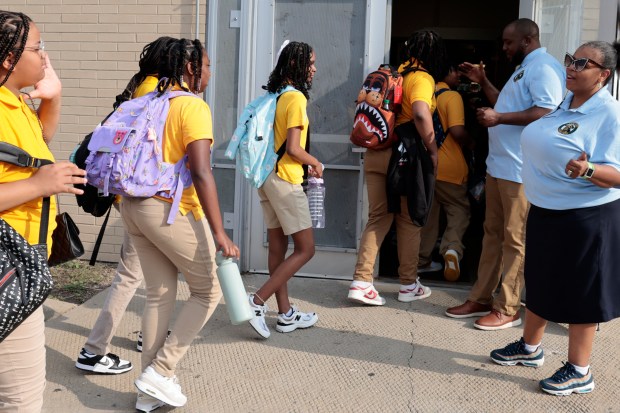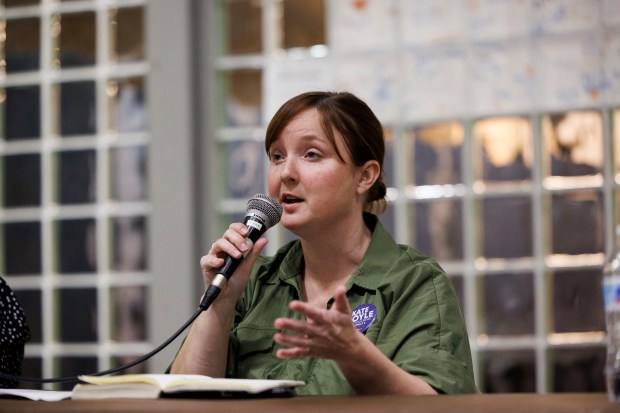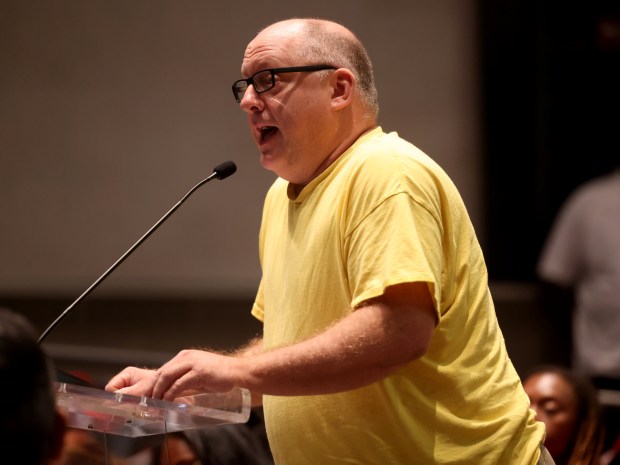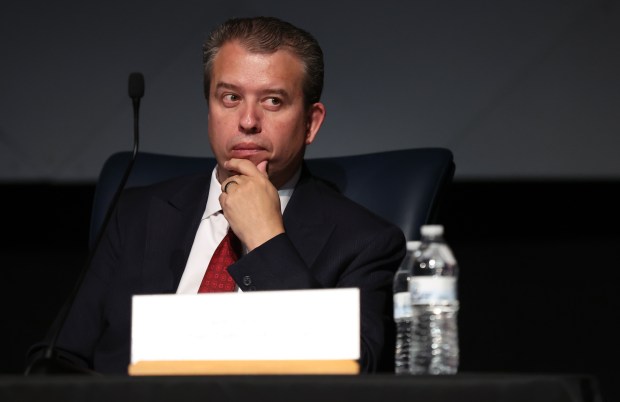The mass resignation of the seven-member Chicago Board of Education may be only the first in a series of upheavals in Chicago Public Schools leadership, heralding an uncertain future for students and families in the district.
Although the board will transition to a hybrid elected and appointed makeup in January, the current seven vacancies can only be filled by mayoral appointment.
With plans not yet announced on who would replace the soon-to-be dismissed school board, many parents are concerned about the lack of transparency from the district and Mayor Brandon Johnson.
“Why is this happening when we’re so close to having part of our board be elected?” Maleah Mubashiruddin, a CPS parent whose children attend Peterson Elementary and Whitney Young High School, said. “The district needs to have a leader … (and) there isn’t someone in place. We don’t know who Mayor Johnson is going to appoint. Especially with the school board changing at the start of the school year, there needs to be someone leading this giant district instead of having this void in leadership.”
By selecting an entirely new set of board members, Johnson could choose people who will follow through with key agenda items that have until now been thwarted by CPS Chief Executive Officer Pedro Martinez and the Board of Education — taking out a high-interest loan to cover CPS budget gaps, shifting responsibility for CPS pensions back to the district and finalizing a contract with the Chicago Teachers Union.
A new Board of Education shaped to align with Johnson’s wishes may also be willing to vote to fire Martinez, although such a decision will not come without difficulties. Martinez’ contract requires a six-month notice and 20 weeks of severance pay if he is dismissed without cause, while attempts to dismiss him for cause may open the district up to lawsuits.
The Board of Education, which remains the final authority on Martinez’ employment status, did not vote to oust him last Thursday, despite Johnson’s alleged desire for them to do so. In an editorial in the Tribune last week, Martinez confirmed that the mayor had asked him to step down from his position amid clashes regarding budgeting and pensions in the district.
A bill signed by Gov. JB Pritzker in 2021 requires Johnson to appoint 11 new board members by no later than Dec. 16 for the upcoming term.
Chicago’s Board of Education is not governed by any state statutes when it comes to filling vacancies and has created its own processes for doing so, according to Jeremy Duffy, deputy executive director and general counsel of the Illinois Association of School Boards.
However, the majority of state school districts have chosen to shape their policy for board vacancies to align with guidance from the Illinois Association of School Boards.
In particular, guidelines set by most districts in Illinois dictate that board of education members are responsible for voting on appointments to fill vacant seats, and must accept applications from members of the public.
CPS policy, however, gives the Chicago mayor the final authority on new appointments — making it possible for Johnson to unilaterally hand-pick new members who align with his policy vision.

Even if the “basic operations” of a school district can continue amid major vacancies on the Board of Education, Julie Corbett, founder and president of school district consultancy Corbett Education Consulting LLC, said that any “higher-level” questions of educational policy and budgeting for the district — as well as union negotiations — would be greatly impacted.
Without a quorum, or majority of four of the seven members present at the next board meeting on Oct. 24, CPS rules prohibit voting on any district business, with the exception of adjourning to meet at a later date. Certain actions, such as voting on a budget supplement, also require a two-thirds or three-quarters majority vote by more than four members, according to the policy.
Asked how the district would be affected if a quorum isn’t present at the next meeting, CPS didn’t respond immediately to a request for comment. When asked earlier this week, they didn’t address the question, instead praising members for their service.
“(CPS) is committed to providing a high-quality education to all students and preparing them for success,” a spokesperson said in an emailed statement Monday. “The strides made as a district are partly due to the Chicago Board of Education members who graciously volunteer their time, expertise, and skills to support and serve our students and staff. We are grateful to our board members for their service,” CPS wrote.
Corbett said earlier this week that she’d “never seen anything quite like” the current situation with the Board of Education. She added that she couldn’t think of any other examples where members of an appointed school board in a major U.S. city resigned en masse without any clear scandal or violation of conduct rules.
“Potential liabilities” could also arise for the district during the process of resignations of board members, Corbett added, leading to possible legal challenges that would require time and monetary resources to resolve. This too, she said, would “take away from the day-to-day functioning of the district.”
To Corbett, a school board focusing more on adults than students is never a good thing.
“Any time that there are adults’ interpersonal relationships and those turn negative, it becomes a distraction from teaching and learning, and that would negatively impact both teachers and students,” Corbett said.
The mass resignations may also affect future races for elected school board positions, Corbett said.
When parents and community advocates are “debating whether to run for school board and this is what they see,” their willingness to seek out roles as school district leaders may be impacted, Corbett said.
Kate Doyle, a District 2 school board candidate vying for a spot to represent the far northeastern neighborhoods of the city, said she hopes this moment will highlight to voters the importance of an elected school board and independent candidates, those who haven’t been endorsed by special interest groups.

Doyle said she’s been fielding dozens of calls from parents and they are concerned about who will be appointed in place of the current school board, especially with an elected school board expected to be seated in a couple of months.
“Their concern is really about how much of this is politically motivated and how are we going to ensure stability for students in the midst of this turmoil at the top,” Doyle said.
Many parents are concerned about the district and Johnson’s lack of transparency. Some feel as is things are occurring behind the scenes that they’re not being made aware of and would like increased transparency.
Paul Wargaski, an organizer of CPS Parents for Buses and the father of two CPS students — a fifth grader and an eighth grader — said he found the resignations “confusing.” Although he said he has disagreed with the Board of Education in the past over busing issues, he said he believes that the members’ “hearts are genuine,” which makes their resignations even more concerning to him.

Wargaski added that members of CPS Parents for Buses have been discussing the resignations all afternoon, with some worried about potential lawsuits against CPS or board members if Martinez is terminated. Wargaski added that if the mayor wanted to appoint him to the interim school board, he would be “open to the phone call.”
“What does this do other than create instability for the students in Chicago?” Wargaski said. “Speaking as a parent who craves stability, it is troubling, to say the least, that many wise and smart people see this as the best course of action. Like, what’s going on behind the scenes that this is the best outcome?”
Chicago Tribune’s Sarah Macaraeg contributed.



